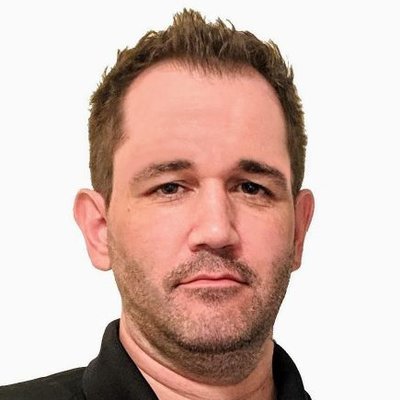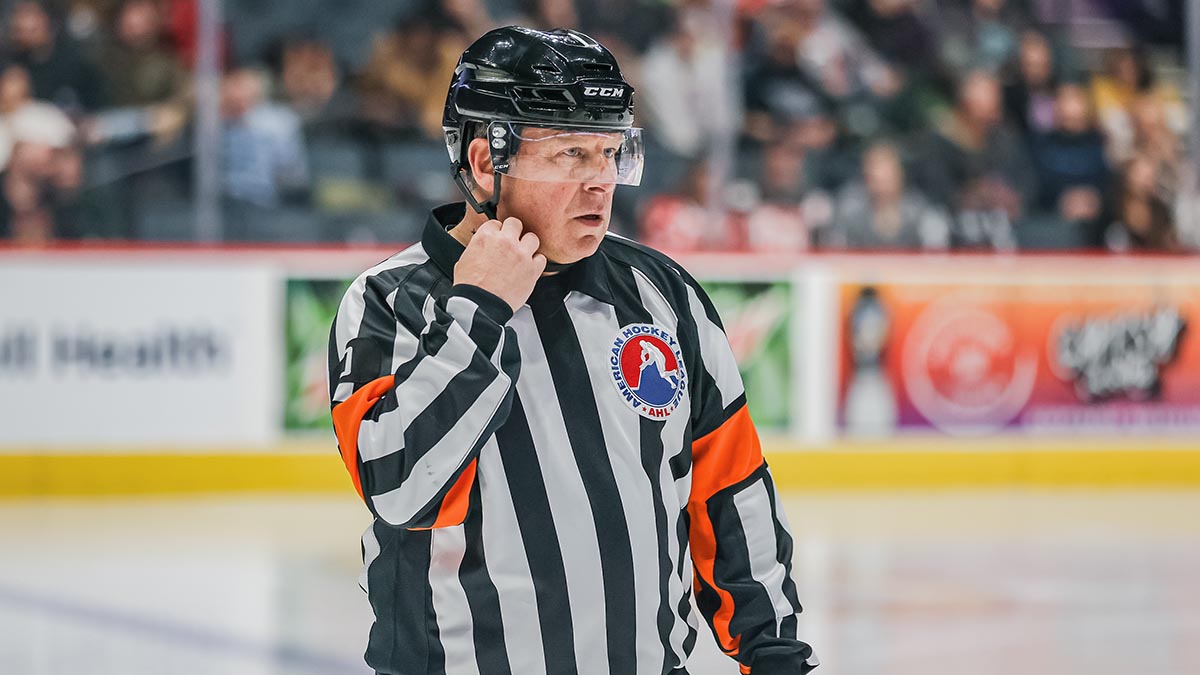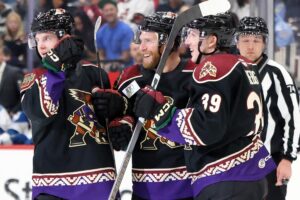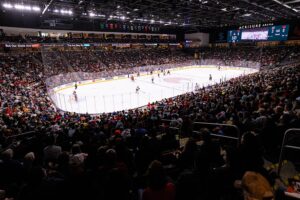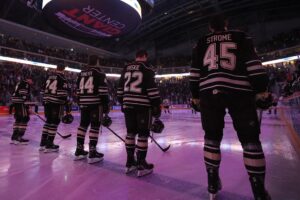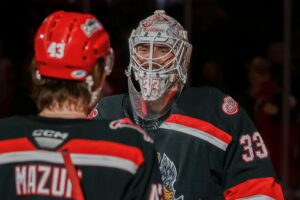📝 by Patrick Williams
For more than 40 years, Terry Koharski has spent his falls, winters, and springs trekking across North America, in search of his next hockey game.
“I still have the passion for the game when I get to the rink and get that feeling, you know what I mean?” Koharski said.
That passion has carried Koharski, 58, through those four decades of hockey, through amassing an ever-increasing list of accomplishments. And it has remained alive through the boos that come with the job, the time away from home and the never-ending challenge of seeking to come as close to perfection as a split-second sport will allow each night.
Start with 11 Calder Cup Finals, including a chance to work Cup-clinching games in 2012 and 2013. A pair of assignments at the AHL All-Star Classic. The final regular-season game at the storied Spectrum in Philadelphia in 2009. A four-overtime playoff game in Bakersfield in 2019. An invitation in 2018-19 to work four games in Germany’s Deutsche Eishockey Liga. More recently, the first-ever game at Acrisure Arena, the new home of the Coachella Valley Firebirds.
| MOST MEMORABLE MOMENTS 🏒 2007 Calder Cup Finals between Hamilton and Hershey (his first) 🏒 The final regular-season game at the Spectrum in Philadelphia on April 10, 2009 🏒 The AHL’s first-ever outdoor game, on Feb. 20, 2010, in Syracuse MOST MEMORABLE BUILDINGS 🏒 Upstate Medical University Arena in Syracuse: “The fans are right on top of you. Blue-collar fans.” 🏒 Van Andel Arena in Grand Rapids: “That’s top-three.” 🏒 “The Canadian cities, they know their hockey. Rochester, Syracuse, Utica, you had better know how to referee. And Hershey.” MOST MEMORABLE HEAD COACHES WORKING WITH TEAM CAPTAINS STAYING HEALTHY “I’ve been fortunate in my career with injuries.” MENTORSHIP ADVICE TO OFFICIALS 🏒 “This business is two things — a thick skin and a sense of humor. I mean, you’ve got to have a rapport with the coaches. You’re going to have a hot coach one night. Go over and talk to him, bring him down to your level. He’s at a 10. Bring him down to a four or five.” 🏒 “Admit your mistakes. If you screw up, you’re going to gain more respect [admitting that] than anything.” 🏒 “I’ll tell you if I screw up. We’re all going to mess up. Split-second reactions in this game. We all don’t have a perfect game every night. Even if you’re feeling good out on the ice, after the game look at the video.” HOW HE WOULD LIKE TO BE REMEMBERED “I just want to be known as a good guy, a team guy. That’s all I can ask.” WHAT COMES NEXT “I want to coach [young officials], to make them better. That’s my goal right now.” – by Patrick Williams |
Or perhaps it is the sheer longevity that most stands out: This is a career that dates to working the AHL lines in 1982, his first turn as an AHL referee in 1988-89, swings through a variety of other leagues, and finally settling in the AHL for good in 2002.
With that base, new experiences have become increasingly rare for Koharski, who has had an on-ice vantage point for the AHL’s evolution from a regional 13-team league back in 1982 to a 32-team behemoth that now stretches from Quebec to Southern California and develops the National Hockey League’s top young talent.
But when he steps on the ice at MassMutual Center on Saturday night to work the Belleville Senators-Springfield Thunderbirds game, he will face the ultimate new experience — his final AHL game.
And what a way to bring that career to a close. A Saturday night tilt. In Springfield, the AHL’s historic home. And with Shae, his daughter and the Thunderbirds’ coordinator of social media and digital marketing, there alongside other family and friends to take it all in for one last time with him.
“It’s bittersweet,” Koharski said. “Nervous… excited… If you’re not nervous, you’re not human. I want everything to go smoothly, just enjoy the night and the weekend.”
Frankly, it is difficult to picture the AHL without Koharski.
Hockey has been the Koharski family business for decades, after all. Terry’s older brother Don broke into the AHL in 1976 and went on to spend 32 seasons in the NHL as a referee and linesman, working nearly 2,000 games. Jamie, his nephew, logged more than 12 seasons as an AHL referee and is married to Liz, the director of hockey administration for the Tampa Bay Lightning and one-time executive assistant to former AHL President and CEO Dave Andrews.
Like so many officials, Koharski once harbored his own playing ambitions. But when that avenue closed, the native of Dartmouth, N.S., turned to officiating. By that point, Don already had reached the NHL. With the storied Nova Scotia Voyageurs playing nearby in Halifax, Koharski broke into the AHL as a local linesman, and he was on his way — wherever the game took him.
The 1980’s-era AHL had built a strong foothold in much of Atlantic Canada with several clubs in Nova Scotia and New Brunswick, and Koharski put in seven years criss-crossing the Maritimes. He worked major junior games in the Canadian Hockey League, and pro games in the ECHL and the International Hockey League. He was based in North Carolina when the AHL added a team in Greensboro in 1995, and he worked games there for two seasons. He later moved to Springfield, and after years in New England, today is based in the San Antonio area, a location that has allowed easy air access to the league’s ever-growing geography.
Heading to Texas, though? That was not a hockey-based decision.
“Love,” said Koharski with a hearty laugh. He remarried two years ago and moved south, where he also holds a full-time job with American Airlines.
All of those hours would wear down anyone. Working as an official in any league brings with it demanding travel. There is no team bus. Late-night hours driving over snowy highways, early-morning flights and layovers — they all add up through the years.
“It gets lonely on the road,” Koharski said bluntly.
Certainly Koharski will not miss that part of the job, the day-to-day, week-to-week travel grind. But he does hope to remain in the game in some sort of mentorship role for the next generation of young officials.
If he does, he can pass along an ability and willingness to adapt to change that has served him well. Progressing through his career required him to handle different on-ice roles in multiple leagues. As the years piled up, the environment around him changed markedly. Creating the proper conditions for player development took on an increasingly important role for the AHL, particularly after Andrews arrived in 1994. The AHL mirrored the hockey world’s shift from the rugged, physical, low-scoring, style of the 1990’s and early 2000’s into the game of today in which elite skill dominates. Those early days of “rock-and-roll” hockey, as Koharski terms it, no longer are the norm, which does make a referee’s job easier. But nutrition and conditioning have become paramount for players, and the officials who stayed in the business had to match that level of fitness.
Then came the move to the two-referee system. That shift forced Koharski to unlearn old habits and create new ones, but gaining an on-ice partner was something that he believes helped to prolong his career.
Now that career is winding down, however, and Koharski has been on something of an unofficial goodbye tour across the AHL.
Being based in San Antonio meant that Koharski had seen plenty of the Texas Stars in recent years, and they said their goodbyes following a game at H-E-B Center earlier this season. Koharski made his final trek through California last month. Then came his final contest in Hershey on New Year’s Eve, where he shook hands with the Bears and the Providence Bruins.
But last week in Grand Rapids brought one of the most memorable — and spontaneous — moments of his career. With the Thunderbirds visiting Grand Rapids and his daughter on hand for the game, the Griffins held a pre-game ceremony honoring him. After the tribute concluded, he spotted Shae standing at the glass behind one of the nets. He beelined down to the end boards and knocked on the glass to say hello.
“Her being there,” Koharski said, “and me punching the glass like that, that just makes it, man. I mean, she’s been on so many trips with me back in the day.
“Just to see her face… It was just perfect. You couldn’t ask for anything better than that. That hit home.”
Saturday night at MassMutual Center will bring even more of those familiar faces. This Is Your Life, hockey-style. Players, coaches, trainers, locker room attendants, rink crews. For one last evening, Koharski will get to experience that first step on the ice, hear a Saturday night crowd, drop the puck, calm highly competitive personalities, and take in that up-close view of some of the world’s best young talent battling for NHL opportunities.
“I still love the game,” Koharski said. “I still love going out there. You just fall in love with it. It’s part of the family, part of the blood.
“It was a journey, man.”
TheAHL.com features writer Patrick Williams has been on the American Hockey League beat for nearly two decades for outlets including NHL.com, Sportsnet, TSN, The Hockey News, SiriusXM NHL Network Radio and SLAM! Sports, and was most recently the co-host of The Hockey News On The ‘A’ podcast. He was the recipient of the AHL’s James H. Ellery Memorial Award for his outstanding coverage of the league in 2016.